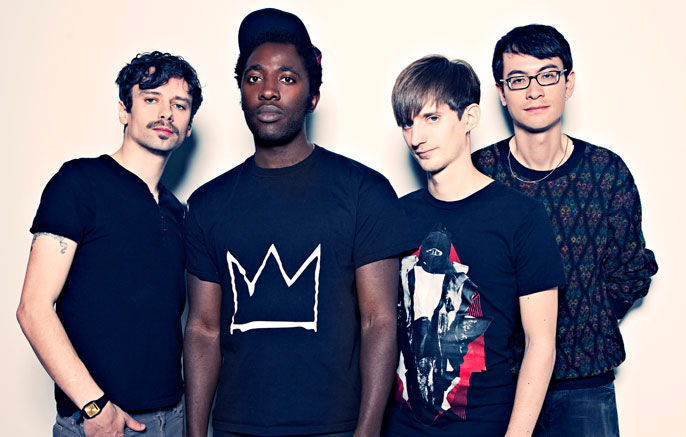Shortly before Bloc Party released Intimacy I read an article where Kele Okereke stated that during his music-infatuated school days after the release of an anticipated rock album he and his mates would lounge around campus discussing its merits (or weaknesses). I love the image he painted because it reminds me of countless moments of debate with friends when I was a kid about what we thought were important new albums. Some of my favorites include:
- Standing in line one Saturday morning at the Salt Palace for Rush tickets the day after Grace Under Pressure dropped and playing the album on a cassette with a big metallic ghetto blaster trying to figure out whether we loved or hated the band’s foray into synth pop.
- Passionately arguing that Born Again was the best Sabbath since Sabotage (as well as the best Sabbath album cover ever) over a game of quarters one Saturday night at my friend Shawn’s house whilst his parents were at their bowling league.
- Listening to Master of Puppets over and over the day it came out on vinyl in a smoke-filled haze tearfully testifying that I had reached heavy metal nirvana and would never return.
With these experiences in mind, I wish that writing album reviews could be more dialogical – in other words more like having a conversation with someone you respect regarding the music while experiencing it. I certainly can’t produce that here (and I have no intention of manufacturing a funny conversation with a dead president or fictional demigod). However, I would like this blog entry to function more as an exercise in expressing ideas than an authoritative, informed opinion (which it most certainly isn’t).
 My view of Bloc Party’s new disc Four is this: it rocks. Having been the band that brought me back into the fold of alternative rock music when Silent Alarm dropped in 2005 (prior to this I had been drowning in a sea of acid/nu jazz, trip hop, and trance/house music since about 1996 thanks to my days listening to the radio in Philly), this may be a biased assessment. However, Four offers a considerable departure from the sonic explorations of Intimacy (an album, barring the grating first track “Ares,” I enjoy immensely) and possesses some back-to-basics heavy guitar riffing and power drumming, sprinkled with several considerably interesting musical ideas.
My view of Bloc Party’s new disc Four is this: it rocks. Having been the band that brought me back into the fold of alternative rock music when Silent Alarm dropped in 2005 (prior to this I had been drowning in a sea of acid/nu jazz, trip hop, and trance/house music since about 1996 thanks to my days listening to the radio in Philly), this may be a biased assessment. However, Four offers a considerable departure from the sonic explorations of Intimacy (an album, barring the grating first track “Ares,” I enjoy immensely) and possesses some back-to-basics heavy guitar riffing and power drumming, sprinkled with several considerably interesting musical ideas.
The album doesn’t really begin to hit its stride though until the third tack, “Octopus,” which features a tinny guitar riff at the final bridge conjuring the image of a Dracula-themed amusement park ride soundtrack on helium. Following “Octopus,” Bloc Party tics off several solid tunes in a row all enjoying fascinating moments such as the banjo-like picking on “Real Talk,” mammoth guitar riffs and open high-hat muscle drumming on “Kettling;” and the meandering pop of “Day Four.” Once the folksy-acousticness on “Coliseum” lands, the album’s stimulating progression seems to screech to a disturbing halt, but is suddenly and surprisingly resuscitated by a heavy metal riff and Okereke’s punching yelps – definitely the album’s most white-knuckle moment. The intensity of the record sadly tapers off with “”V.A.L.I.S.” – a hook-filled lightweight compared to the prior five songs. “Team A” then proceeds to masquerade as a snoozer (repetitive riffing for several minutes into the song) until it breaks into perhaps the loudest tune in the set. “Truth” follows as an appealing although not incredibly exciting pop song.
Four winds down with “The Healing” – a lower tempo, layered, atmospheric number that serves to break the momentum of the second wind the album catches with the latter half of “Team A” and “Truth.” The album comes to a raucous, punk rock completion with “We Are Not Good People.” Throughout its twelve-song run, Four is also laced with some pretty humorous banter from Okereke breaching topics as diverse as turkey breasts and spider bites.
Okay, it doesn’t provide that high octane super rush that Silent Alarm did (and nothing reaching that level probably ever will), and at moments its musical concepts seem desperately disjointed compared to the consistency found in Intimacy and A Weekend in the City (the unfortunate lack of transition between “The Healing” and “We Are Not Good People” offers a glaring case in point), yet Four is a nifty new record providing me something to talk about solid enough to endure long waits for concert tickets, juvenile drinking games (do people still wait in line for tickets or play quarters?), and smokey living rooms. Now I just need to find someone to talk to…




